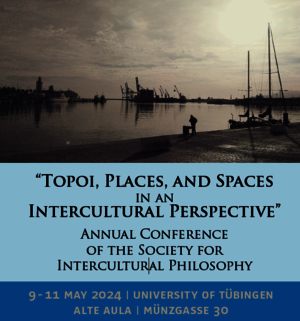Annual Conference GIP 2024
“Topoi, Places, and Spaces in an Intercultural Perspective”
Annual Conference of the Society for Intercultural Philosophy (GIP)
“Topoi, Places, and Spaces in an Intercultural Perspective”
Organized by Niels Weidtmann and Abbed Kanoor
9–11 May 2024
University of Tübingen, online (via Zoom)
Alte Aula (Münzgasse 30, Tübingen)
The conference will be held in english
Download the detailed program here.
Keynotes: Augustin Berque, Edward Casey, Nathalie Depraz, Tao DuFour, Workineh Kelbessa Golga, Anke Graness, Tim Ingold, Ikechukwu Anthony Kanu, Kwok-ying Lau, Ali Asghar Mosleh, Rita Segato, Jaroslava Vydrová
Theme: The study and intercultural comparison of topoi, places and spaces are of great importance for intercultural philosophy: (i) intercultural thinking itself can be described as topographical, building on the stronger turn to space in philosophy in the second half of the 20th century. (ii) Differently designed places and spaces can open up new and non-textual accesses to other cultural life-worlds.
(i) While in the first half of the twentieth century European philosophy tended to focus on reflections on time and temporality (Bergson, Husserl, Heidegger), the transition to the second half of the twentieth century was accompanied by increasing attention to the relevance of topos and spatiality (Merleau-Ponty, Blanchot, Deleuze, Foucault, Derrida). Parallel to the new relevance of topos and spatiality in philosophy, the birth of structuralism and structuralist anthropology marks the 1960s, where the question of topos gains anthropological and cultural importance. This topological interest was accompanied by a process of decentralisation. The backlash of postcolonial movements awakens national/indigenous self-consciousness as a situated "we". The way in which the Negritude movement marked African thought in the 1960s and 1970s clearly shows the need for "other places from which to think" (Eboussi Boulaga). Comparable philosophical thematisation of the topos and location of thought has also been outlined in other geographies and languages, such as the Arabic-speaking world (Abed al-Jabri). The process of decentralisation is an important counterpart to the cultural turn. If the homogeneously imagined and measurable space is the signum of modernity and its idea of globality, we are currently experiencing a return to a multiplicity of situated forms of life and lived spaces. This is strongly debated in anthropology (e.g. in the so-called "ontological turn"): Viveiros de Castro, Descola, Holbraad) and in relation to critiques of the nature-culture divide in literature and science and technology studies, feminist theory and critical posthumanism (Butler, Haraway). However, these approaches often lack an eye for the historical depth and intellectual-historical significance of the respective spaces, including the homogeneously imagined space of modernity. This underlines the importance of an interdisciplinary exchange on these issues.
(ii) Images and works of art, as well as architecture and even landscapes, provide a unique access to cultural traditions and their thinking. Watsuji's famous study of climatic influences on humanity is an early example of this, but it has also been shown in relation to art and architecture (most recently by Descola in his Les forms du visible) - and particularly well in relation to East Asia (Suzuki, Ohashi, Obert). However, the relational structure of spaces and places to cultural traditions also becomes relevant in the other direction. This is most obvious in relation to environmental issues. In environmental studies, non-Western approaches are becoming increasingly relevant. This is true in relation to the recognition of Amerindian epistemologies mentioned above, but it is also true in relation to African epistemologies, which offer inspiring alternative ways of thinking. Finally, eco-phenomenology (Toadvine, Brown), rhizomatic and nomadic thinking (Deleuze & Guattari) and religious studies contribute to the discussion of lived spaces. However, these different strands of thought have rarely been brought together and made fruitful for intercultural philosophy.
This is what we want to do with our conference.
The conference will take place in-person at Tübingen University. However, online participation via ZOOM will be possible as well. Please register for free via info (AT) cof.uni-tuebingen.de. You will receive the invitation link a few days prior to the conference. The link allows you to participate in all sessions.
